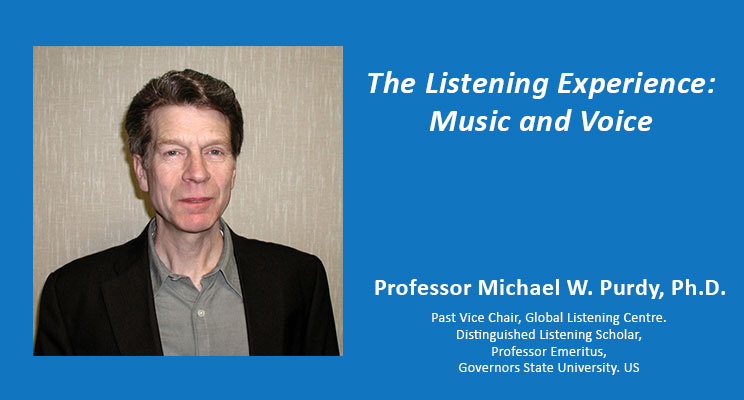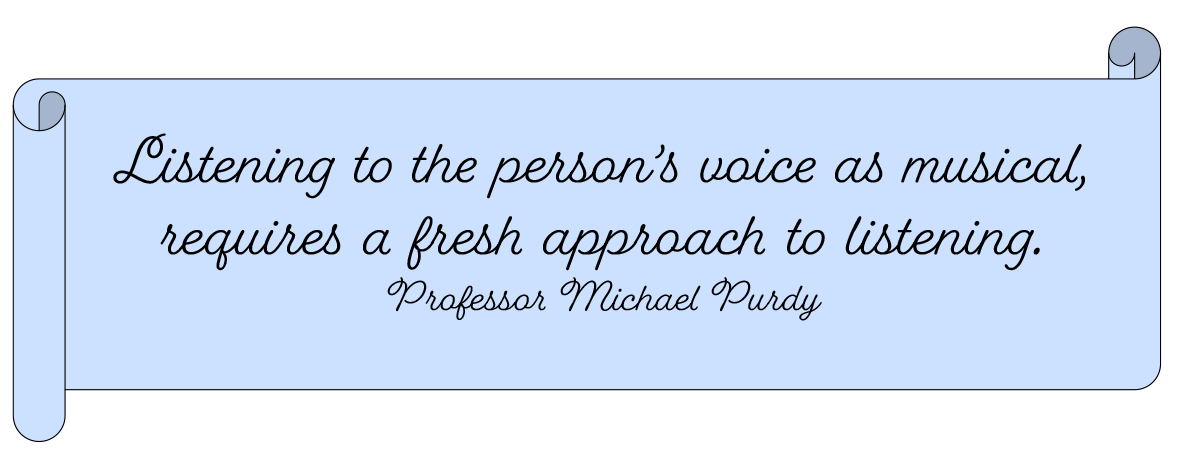
The Listening Experience: Music and Voice
Professor Michael W. Purdy, Ph.D.
Past Vice Chair, Global Listening Centre.
Distinguished Listening Scholar,
Professor Emeritus,
Governors State University. US
Listening to music offers clues for listening to a person’s voice; both have some informative qualities that can help transform our listening.
Arthur Schopenhauer, a 19th-Century German philosopher, said that listening to music was the direct experience of the reality of the music. When we listen to music, nothing intervenes in the experience because we have direct access to the musical sound without distortion of perception. We feel what we hear, and we know it is true.
Schopenhauer wrote: “Music avoids and hence does not pass through the Ideas [sic] in its revealing of the thing itself; it leads directly to the will itself and immediately renders it available, present, and experienceable” (https://that-which.com/schopenhauer-on-music-a -copy-of-the-will-itself/). Will here refers to the needs, wants, and intentions of those who create the musical sounds and the experience thereof. Music also skirts the “Ideas,” our interpretation and thinking—ideas–about the music, giving us direct access to the emotions and feelings stirred up by the rich experience of listening. Neuroscientist and musician Daniel Levitin in his book This Is Your Brain on Music (2006) claims that in excess of “100 neurochemicals are involved in computing music’s pitches, durations, volume settings and timbres,” and our brain seems to be fully engaged, stimulating “neurons in more regions of the brain than almost any other activity.”
In this sense of listening to music, there is no perceptual interpretation; what we hear is what is being performed or played. Again, the music is not an idea, it is a sensibility, a direct perception without any conception– though some music does work to tell a story. Still, the effect of the sounds penetrates the body and we feel the mood, the rhythm, the intonation, the pacing, and the pulse of the music. Personally, when I listen to music, I am not so concerned with the lyrics; I just want to experience the color and delight of it. I want to experience its rhythm and mood, and sometimes it moves me so much that, if the space is open, I want to move my whole body with the music and dance!
Now, extend this shift in listening to the voices of others: their tone, the mood rendered by the feeling of their voices. We seldom listen to the voice of the other (in itself), but we should. Here, there is something to learn. Everyone has a “musical” voice, which we can experience in some fashion, directly, apart from the meaning of what is being said. Some voices are high-pitched, others more baritone, or maybe raspy, or deeper as we get older. What is the timber of the voice? What is the range of the vocal tones? The directness? There is so much to appreciate in the music of the voice. When we listen to our friend, family member, colleague or coworker, we can very much appreciate the sound of their voices. Listening to the music of the voice is a rare direct experience of our shared lives.
Any shift in our way of listening, such as listening to the person’s voice as musical, requires a fresh approach to listening, and a new awareness, and perhaps the learning of new skills–most would say an adjustment toward enhancing the art of listening. Changes like this reverberate throughout our listening awareness and offer a renewal of our listening knowledge and ability—chances are we will become better listeners as we appreciate the sound of a person’s voice (from persona—literally through or by the sound itself).
As an example of the potential to learn anew about listening, consider the experience of the blind. They do not have direct access to all the signals of sight, such as the nonverbal cues of the body that accompany and complement the face of the other. They listen for the meaning of the conversation, but they must also be critically aware of the musical tone of the voice. The way we attend to another person as we listen is so vital! We depend so much on the face, particularly, and the look of the other; we usually face the person we are talking to; they are right there and we hear their tone of voice. Generally, however, we listen for what their communication means or for some conceptualization, rather than their mood or some sense of feeling conveyed through the voice. Perhaps, if we took more notice of the voice itself, the musical nature of the voice, we could attend to another dimension of listening and enrich that experience.
Hence, there is much to learn and to be aware of as we listen anew and become directly conscious of the other’s voice. Maybe we will discover that we are listening better to the vocal resonances of those with whom we want to communicate. In the moment of communication, we find that we are listening to appreciate those who are around us in a new, more artful manner, in a way that enriches our listening experience.
